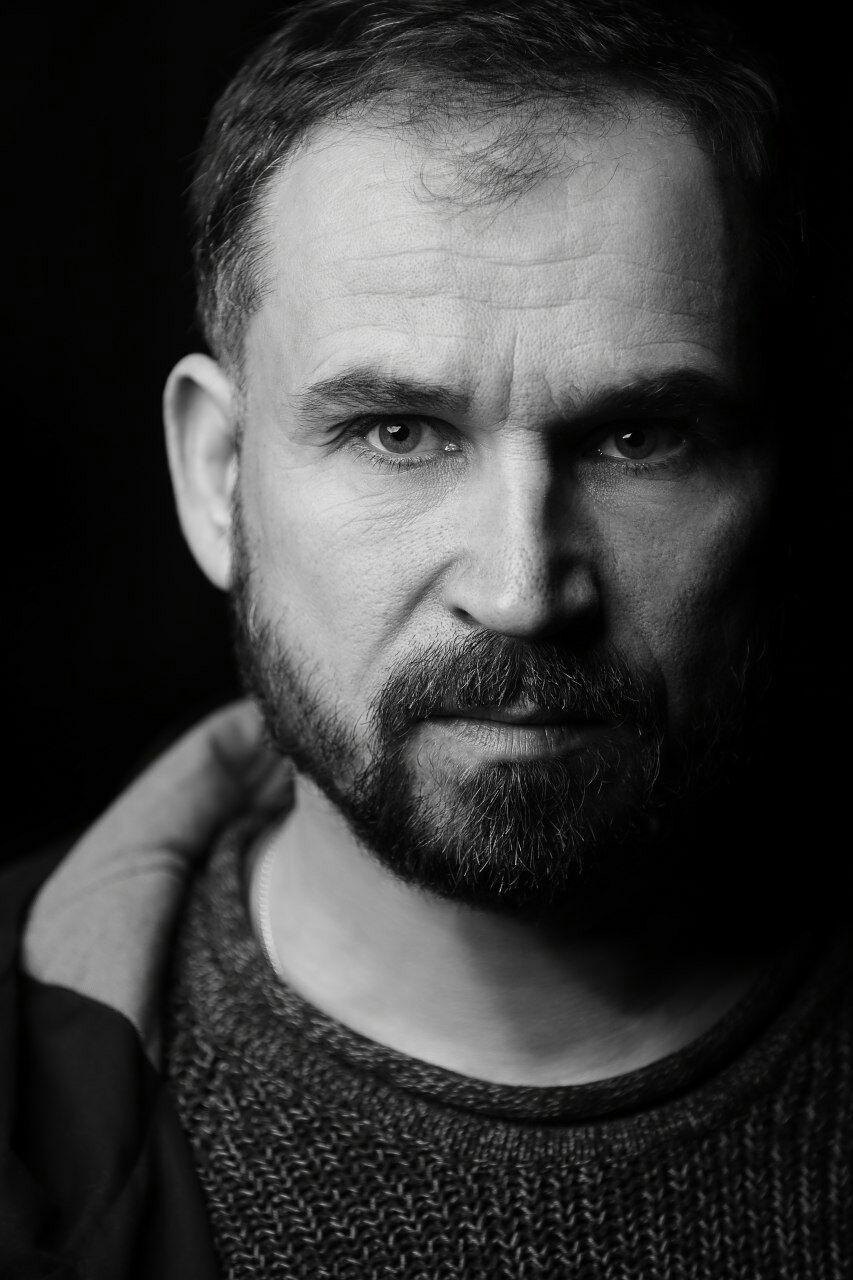
“We are gradually reaching a level where even so-called mass market theatre is of a high standard”
The premiere of Medea has just taken place, and many warm words have been said about it – in particular, that it marks a milestone for the theatre. Tell us about this milestone, and why you chose such a complex text in the first place?
First of all, Medea is one of the most striking examples of world drama – it’s Euripides. Greek tragedy, Shakespeare – such works can only appear in the repertoire when the theatre has performers capable of handling them. In this case, we needed Medea. Nadezhda Levchenko, who played the role brilliantly, and many other members of the company joined us straight after graduating – back when I became the theatre’s director in 2008. Now, they have grown into such roles – they can tackle serious material and perform at a high level. That’s the milestone for the play.
But I would speak even more broadly – about a milestone season. Our team has reached a point where certain productions and collaborations with specific directors have become possible. Medea is, in a way, a pinnacle – a dream role for an actress, and for the theatre as a whole.
It’s a very complex text because, in addition to Euripides, there is Heiner Müller (German playwright and experimental director of the second half of the twentieth century), and there is more Müller than Euripides. But to all of this, you have added a layer of our modernity. Who wrote the part about modernity, and how does it all fit together?
Of course, there’s a lot of Müller, and here I give a big bow to Oksana Dmitriyeva (director of Medea; works at the Kharkiv Puppet Theatre). I’m very happy that we finally managed to work with her. I’d been negotiating for several years, and I was particularly interested in having our actors go to the puppet theatre. In general, I really enjoy the combination of puppets and live performance – a certain resonance arises from the actors’ interaction with the puppets, something third emerges, and it’s very compelling.
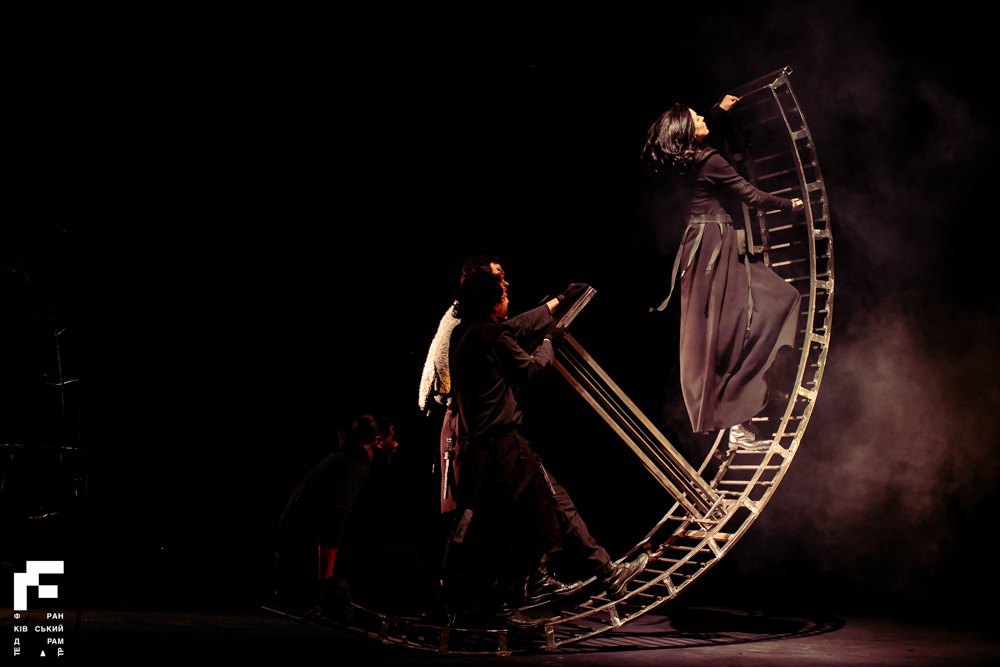
Medea, of course, is not a puppet show, but it does include puppet elements – these are actually art objects created by Konstantin Zorkin. And the texts about modernity were written by Oksana – it’s her personal confession, in a way. Both Kostyantyn and Oksana are from Kharkiv. And there, because of the war happening so close to them, creative energy – including in the theatre – has become very intense. They have something urgent to shout to the world. So this is Oksana’s story too, and our Medea, in addition to Euripides and Müller, is also Dmitrieva’s.
You started talking about the stages of this season, so let’s look at your programme in detail. It’s quite varied – there are lighter works like Natalka Poltavka, but also more challenging productions such as Medea and The White Shadow by Čapek. How do you decide when to stage a potentially box-office production and when to present something experimental? And are these truly opposing poles?
Since I became director, I’ve been trying to maintain a balance. In Ivano-Frankivsk, apart from us, there’s the Puppet Theatre, and a few years ago a new youth theatre [Franco-theatre] opened in nearby Kolomyya – but on a large scale, ours is the only theatre here, and we have to satisfy the tastes of different audiences. I call it balancing between mass market and experimental theatre. But I also believe that we are gradually reaching a level where the so-called mass market is also of a high standard.
We understand that the plays we stage purely for artistic exploration can’t attract large audiences – like Medea or 1975. That’s a documentary piece by Slovenian director Tomi Janežić. We travelled to Slovenia, the actors shared their stories with him, and this play is based on those stories. Or The White Shadow, which you mentioned – that’s physical theatre, and I’d wanted to explore it for a long time.
What is physical theatre?
It’s when there is no text – when actors convey meaning through their bodies, through physicality, through movement and presence.
And then there’s Natalka Poltavka, for example, where we tried to create a musical. It seems to be a light genre, but in reality, it’s very demanding to work with. It’s a strong, well-written drama [by Ivan Kotlyarevskyy], dating back to 1819 – a milestone in Ukrainian theatre. Lysenko composed the music for it much later (in 1889 – Ed.), and we fell in love with that music, even though we’d long been told it was all rubbish and sharovarshchyna. There have been many productions of it, but we reworked everything – there are no everyday dialogues in our version. Instead, it’s built around rhythm, rap, and recitatives. And the music sounded completely new.
It was a huge challenge for our theatre – there’s an orchestra, live musicians, and 30 people on stage, mostly young performers. The average age is about 24 – students are playing. This was a production we originally planned as mass market, for a large hall. But the result, I believe, is very cool. It’s a high professional level.
I should also say that we’ve educated our audience. We are growing – and the audience is growing with us. They will no longer watch something of poor quality. And this rising level of expectation also pushes us forward.
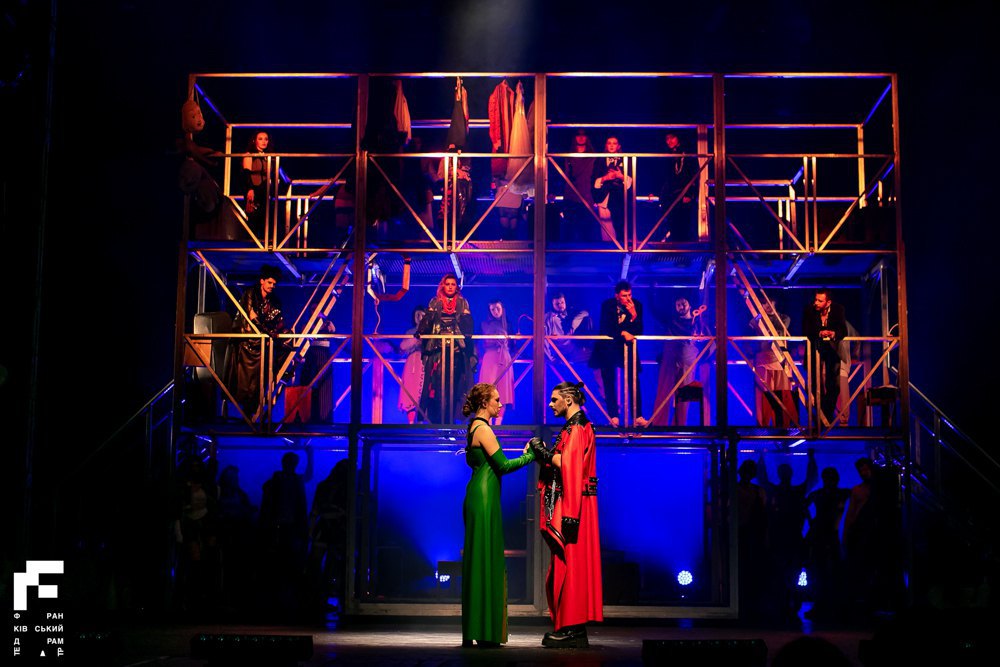
“The theatre should be at the forefront – educating, guiding, responding”
There is a lot of talk in Kyiv about the theatre boom, referring to sold-out venues and full houses. It seems to me, firstly, that this began in Frankivsk long before Kyiv, and secondly, that a real boom cannot be measured by quantity alone.
There are different views on what theatre should be. Some say it should stage plays about the eternal – but I’ve never believed that. For me, the theatre should be at the forefront of all processes. It should educate, offer direction, and respond to what is happening today. We are at war now, and we cannot pretend otherwise.
And that’s what we’ve always done – reacted. That’s why we’ve learnt to work with difficult material, and the audience has learnt to accept it. This is how it works: we teach them, and they teach us.
One of the responses to the full-scale invasion has been the rejection of Russian culture. You refused to stage The Idiot by Dostoevskiy, the National Opera declined to stage The Nutcracker, and everyone found their own way to replace such works. Meanwhile, the Vodyanyi Theatre in Odesa is staging The Golden Calf, clearly referencing the Mosfilm adaptation, and Wedding in Malynivka is being performed in Dnipro. This seems to me like pandering to audiences nostalgic for a fictional Soviet past. How do you feel about this?
This is an abnormal process. It needs to be cut off – harshly and clearly. I believe the state should intervene.
But we don’t have censorship.
But we do have a vision of why state institutions exist – they must serve Ukraine, not the aggressor country. I believe that such productions, which play into this so-called memory or nostalgia, are actually working for the enemy. They should be discarded, and those who promote them should step down. It’s a horror. We will never defeat the enemy as long as we continue doing things like this.
Because of the war, many theatres have been left without premises and have had to rethink their relationship with traditional stages and buildings. Your theatre is doing this too – but not out of necessity, rather through creative exploration. You work inventively with space: you have six stages, including a basement and a foyer; you perform on Mount Pip Ivan, in the Chornobyl Zone, even right in the city square. What is this approach about?
Personally, I really enjoy integrating my work into different spaces. It allows me to avoid props and artificiality. We opened the basement stage during the first Porto Franko GogolFest. I went down there with Roman Hryhoriv (composer; together with Ilya Razumeyko he wrote the music for the horror opera HAMLET, staged by me), and he said: “Damn, what a cool space – I’ll write music for it, for some kind of performance.” That’s how the idea for Hamlet came about – the space dictated our decisions, because the place used to be a cemetery, and if you dig around, you could definitely find some Yorick. We later moved other theatre productions into different settings – for example, we performed in Pniv Castle, on Pip Ivan, and in many other locations. These spaces add new layers of meaning, and that’s what keeps the production alive. It’s a very powerful tool.
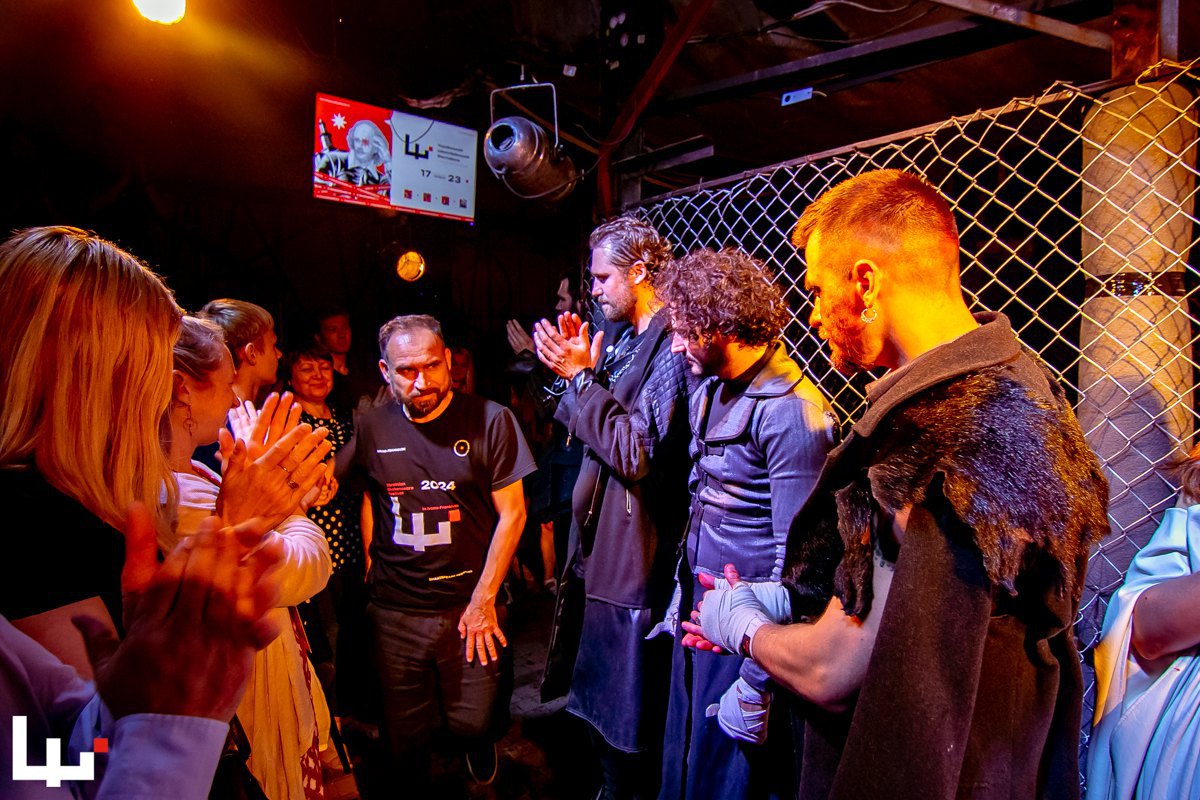
In general, I like to try new things – I don’t repeat myself. Unless it’s, say, a trilogy, where the parts are obviously connected, like my HAMLET, ROMEO & JULIET, and what I expect will become a third piece. But overall, I believe life on this earth is too short to keep doing what you’ve already done – to repeat what you already know.
“Many theatres are now staging Shakespeare to get into our Shakespeare Festival”
Let’s continue with Shakespeare. In June, you’ll be hosting your second Shakespeare Festival. What did the first one give you, and what are your expectations for the second?
Here, I’m grateful to fate – and to the people who gathered around this idea. In particular, Iryna Chuzhynova (Deputy Director of the Ivano-Frankivsk Theatre), who moved here and became the curator of the festival. Last year, people looked at me like I was mad and asked why on earth there was a Shakespeare Festival in Frankivsk.
I said: well, I’m a Hutsul, and I brought Hutsulia into the theatre – but we can’t ride that alone, no matter how much we want to. You grow on high drama, on strong material – and it gives weight and volume to our other productions.
Besides, this connects us to the broader European context. It allows us to join the network of Shakespearean festivals. We held our first festival, and now we’re already part of the Shakespeare Network – and we’re getting invited to other festivals, too.
Honestly, we didn’t expect the response we received. Despite the war, foreign Shakespeare scholars came – and this is a very respected community. Among them were Michael Dobson, Director of the Shakespeare Institute, Nicoleta Cinpoeş, a Shakespeare scholar and professor at the University of Worcester, and others from Poland, the UK, and beyond. And they discovered Ukrainian theatre – and Ukrainian Shakespeare.
Frankly, this is what we need to work for. We have a strong theatre, and I’ve never had an inferiority complex. Yes, there are times when we face challenges with direction, but I truly believe we have something to show the world. We possess something that Europe may have already lost.
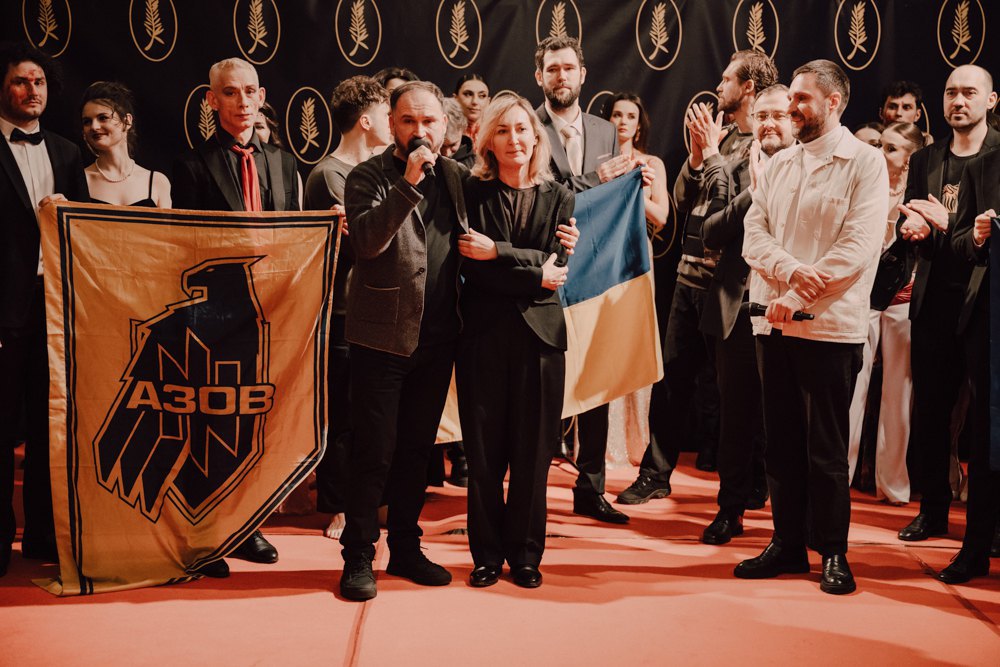
What exactly?
For example, we’re more emotional. In some ways, we may lack form or structure, but when our emotional intuition combines with discipline and form, the result is unique. Over there [in Europe], actors — I know this for a fact — don’t act the way we do anymore. They’ve lost that kind of expression.
We have our own tradition, our own school — and we shouldn’t be afraid of that. Our Kurbas school exists, and it’s brilliant.
There’s quite a lot of Shakespeare in Kyiv right now — two Othellos, by Oksana Dmitriyeva and Dmytro Bohomazov, are running in parallel in different theatres, and just in the past few weeks we’ve seen premieres of King Lear by Dmytro Zakhozhenko and Macbeth by Ivan Uryvskyy. Is this connected to the festival?
Yes, of course — and not only in Kyiv. Many theatres are now staging Shakespeare to be part of the festival. And that’s fantastic, because it lifts the whole Ukrainian theatre scene. It pulls everyone upwards.
What is Shakespeare’s uniqueness, in your view? Why has he remained the world’s number one playwright for 400 years?
I love him deeply — because his works are about today, and about tomorrow. I recently reread King Lear and started seriously thinking about staging it — especially since there’s a translation by [Yuriy] Andrukhovych. I believe the success of my Shakespeare productions has a lot to do with his translations. They speak to the present moment. That’s the essence of Shakespeare — it feels as though he’s speaking directly to you, answering your questions. I’m 49, turning 50 this October, God willing, and Lear is very close to me now — even though the character is much older. His monologue still gives me goosebumps.
And Shakespeare has so many of those texts, those monologues — timeless, often prophetic.
But with the Shakespeare Festival, I have another idea. I want to pair Shakespeare with a Ukrainian writer each time — to shine a light on our own theatre, to broadcast Ukrainian playwrights to the world.
Who are you planning to start with?
There was an idea to start with Karpenko-Karyy — he’s foundational, and our theatre used to bear the name Tobilevych. But I’m not sure it will work out this time, or how things will go in general. After Trump, the world’s perception of our security situation has changed. Last year we weren’t afraid to travel, but this year, people are.
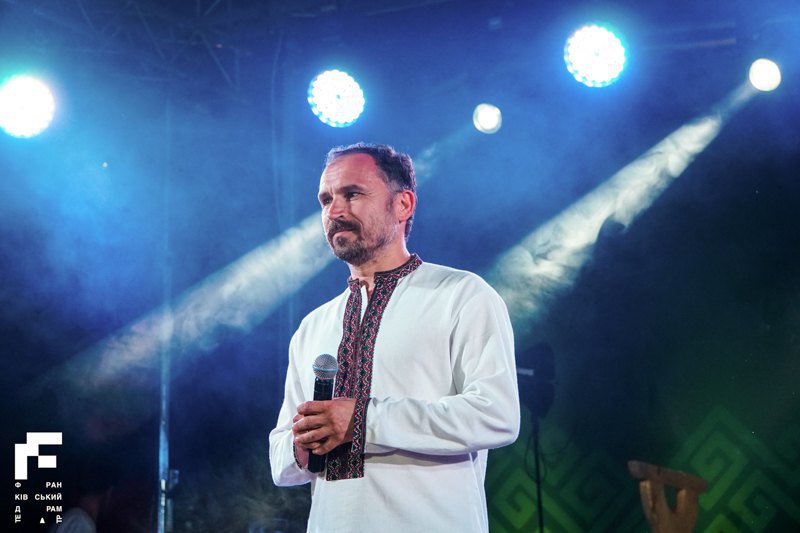
“If we don’t have our own traditions, our own luminaries, we have to invent them”
Speaking of luminaries — we’re speaking on Theatre Day, and you’ve just returned from the cemetery, which you and the actors traditionally visit on this date. Where did that tradition come from?
Before I became director of the theatre, I already had an acting course at the Institute of Arts at the Precarpathian University. I started it in 2003. I invested a lot in those students — and it paid off. Today, we have a wonderful company, and they are my very first students.
Then, when I brought them into the theatre — which at that time was in terrible decline — I realised I didn’t want these brilliant young actors to work in a failing institution. If things had turned out differently and I hadn’t won the competition for the director’s post, I think we would’ve simply opened our own theatre.
But God gave me the opportunity to become a director at the age of 33. Back then, I was the youngest actor in the theatre, can you imagine? And I brought in all these young people. I had a strong foundation from my time at the Zankovetska Theatre, where my teacher was Bohdan Kozak — that’s the Kurbas school, because his teacher was Borys Tyahno, who studied under Kurbas himself.
I don’t know how it is now, but at that time, the Zankovetska Theatre had beautiful traditions — their own songs, for instance. There was nothing like that at the Frankivsk Theatre. And I realised: if we don’t have our own traditions, our own luminaries, we have to invent them.
So I brought back older actors who had already retired — to tell the younger ones how things used to be. We started visiting the cemetery, to remember those who were no longer with us: Oksana Zatvarska (1921–2014), Volodymyr Rod (1929–2013). The older generation and I would share memories about those we had worked with, tell stories about those who were no longer on stage. That’s how this tradition began.
I tried other things too — I even tried to create a theatre anthem — but that didn’t quite catch on. What did take root was this sense of continuity. And it has stayed with us.
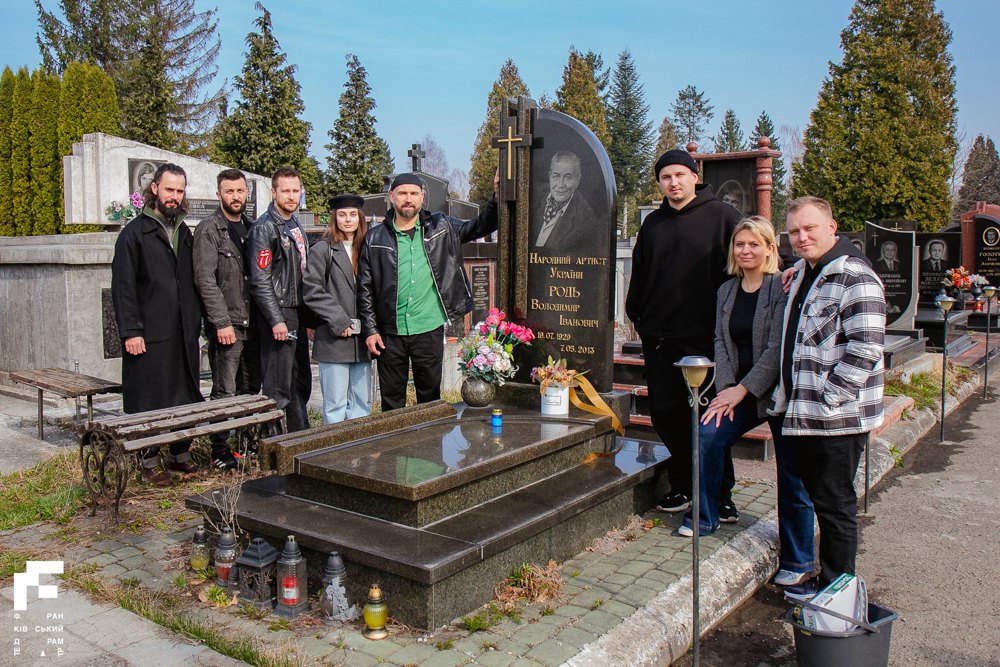
In terms of continuity, your theatre is a special case: a student of Vadym Meller and the son of Hryhoriy Narbut — Militsiya Symashkevych and Danylo Narbut — both worked here as artists. That kind of lineage, which was broken by repression in so many other theatres, has been preserved to some extent in yours.
That’s true. I’ve been running this theatre for 17 years now — but in many ways, I feel like I’m only just beginning to discover what it really is.
It took a tragedy — a full-scale invasion — for us to start truly seeing, researching, and preserving our Ukrainian heritage, which is so rich and powerful. My favourite authors used to be Dostoevskiy, Tolstoy, and Chekhov — and I taught my students to love them, too. We’d been trained to treat our own culture as second-rate.
But now, Ukrainians want to make up for everything we’ve missed — decades, even centuries of missed opportunities. And I’m no exception. I now look at Ukrainian classics in a completely different light.
The same goes for our theatre. The official story says that in 1939, the Soviets arrived and “brought civilisation” — that they founded a theatre that had never existed before. But last season, while preparing for our 85th anniversary, I started digging into the archives. I’m also a trained historian, so I know how to do this kind of research.
And just imagine: I discovered that in 1937, Frankivsk celebrated the 100th anniversary of its theatre. Which means… there was a theatre before 1939!
Then I came across a note in an Austrian newspaper from 1910 — it reported that a Ukrainian Drama Theatre named after Ivan Tobilevych had been founded in Stanislaviv, and opened with a premiere of Natalka Poltavka. So, in 1939, the Soviet theatre was essentially built on the foundation of that earlier Tobilevych troupe. In fact, at the time, there were as many as 14 professional companies in the Stanislav Region.
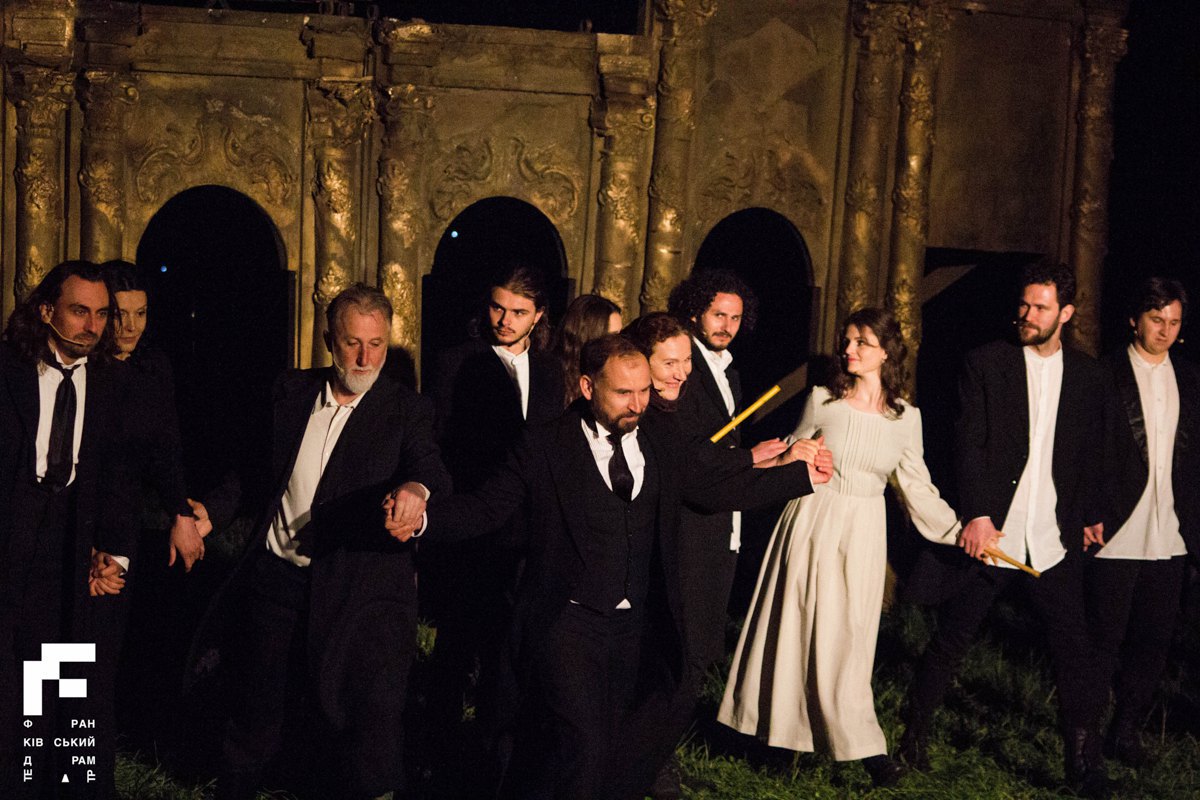
Where did they come from?
I now understand where they came from. In Lviv, there was the Theatre of Russian Conversation, founded in 1864; it ceased to exist in 1924 — most likely due to the Polish repression of Ukrainian culture in Galicia. In Lviv, the pressure was much greater, and everything Ukrainian was being shut down. But in Stanislaviv, there was no such oppression.
So all the creative energy actually moved here. In the 1920s, the theatre scene in Stanislaviv was bustling. There was already a stationary theatre, and even Chekhov was being staged — Uncle Vanya was performed under the name Uncle Ivas. I came across another fascinating newspaper article from the late 1920s: the Lviv gentry appealed to the railway authorities to run special trains between Lviv and Stanislav — so they could travel to see a performance and return the same night.
Then it gets even more interesting. In 1933, this very Tobilevych Theatre opened a branch in Lviv. We were already working for two cities.
I think we’ll hold a roundtable discussion at the end of May to explore all this with researchers. We need to break away from this association with 1939 as our founding year — that year marks the beginning of occupation, and we no longer want to celebrate it. We need to decide on a different year from which we can truly begin the story of our theatre.
There was a rich cultural life here, a strong Kurbas school. And let’s not forget the European context: we were part of Austria-Hungary, then Poland. Vienna is no further from us than Kyiv — it’s just nearby, really.
How exactly does this continuity of the school — and its closeness to Europe — manifest itself?
Since I first came to work here in 1998, I’ve been constantly amazed by the actors — their openness to experimentation, their ability to work in a different way. And now the pieces of the puzzle have fallen into place for me: it’s about continuity.
Kurbas’s student, Volodymyr Blavatskyy, was here. He worked at Berezil in the late 1920s, and later at the Tobilevych Theatre — he even headed it. The actors from the Theatre of Russian Conversation brought European theatre with them. There was always an alternative here to the Stanislavskiy system, which was later imposed across the Soviet Union.
Then perhaps this continuity also lives on in the audience — in their openness to experimentation, in their demand for quality?
You’re right — it’s probably also a tradition of sorts, passed down through something intangible. Sometimes I worry about our next production — will the audience accept it? But I like it, because I’m a hostage of my profession.
But no — every performance finds its audience. We’ve raised a generation of viewers who are already waiting for something new from us. They love us.
And I’ll tell you — this really is a phenomenon: the place the theatre holds in this city. Everyone here knows us — both the directors and the actors. From students to taxi drivers and market vendors.
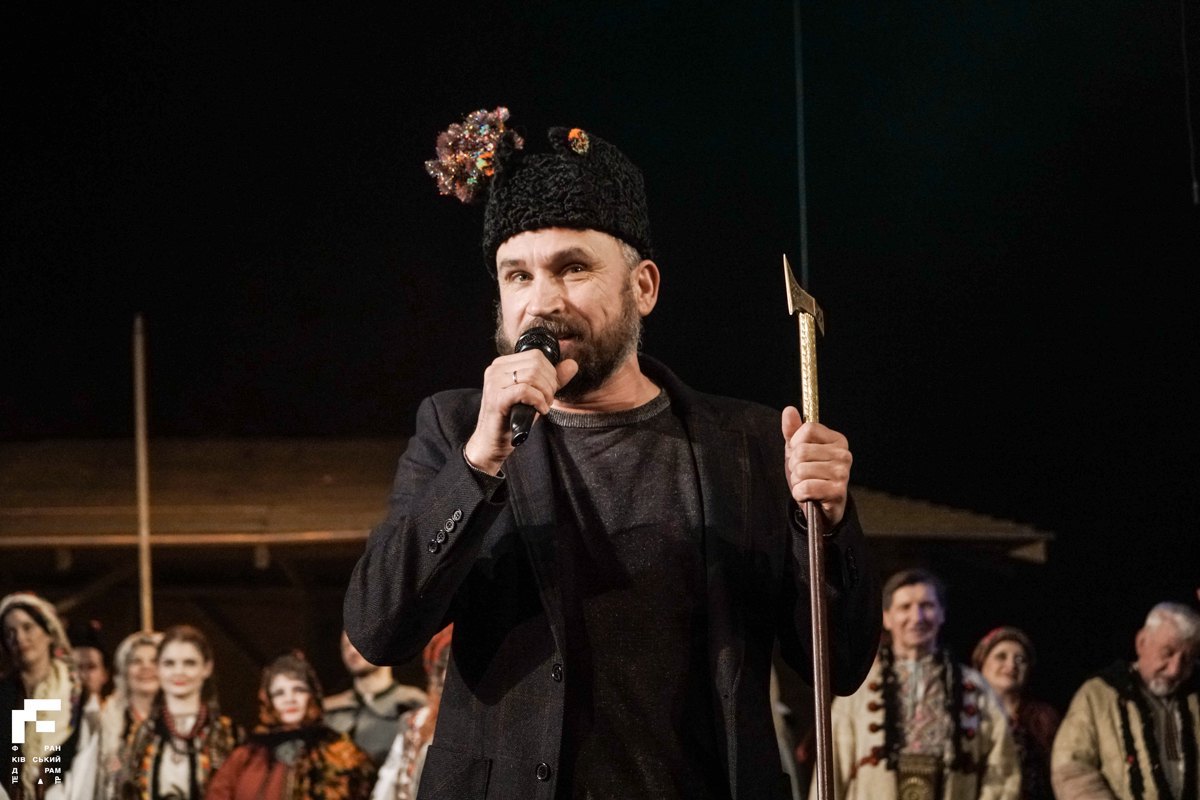
“Working with foreign directors is always a risk, not everyone understands the Ukrainian context”
It seems to me that this issue of audience readiness — or unreadiness — is partly because we know so little about contemporary European theatre. I mean, outside the professional circle. And you’re working on this in a very deliberate way: last season, you focused on inviting European directors.
Yes, that was a conscious choice. When we received the status of a national theatre (in 2019), we began to reflect on what a national theatre should actually do. It definitely shouldn’t be a theatre of one director — it should bring together the best directors from across the country. We’ve gone through that stage, and now we’ve stepped into Europe.
I never invite people just for the sake of it. I only invite directors whose work I’ve seen myself — that way, I know for sure they are among the best. This kind of collaboration offers tremendous opportunities for growth — both for the actors and the theatre overall. It’s a different way of thinking, a different worldview. And it’s also a bridge: a chance to step into Europe through these directors.
Who have you already worked with — and who are you planning to work with?
In Paris, I met Mihai Tarna (chief director of Teatrul Fără Nume in Chișinău), invited him, and he worked with us. Jules Audry (director of the French ensemble Futur Noir) was our chief director for a while. Lithuanian theatre is one of my favourites, so we invited Jokūbas Brazys (director of Vilniaus Senasis Teatras).
We also have a great partnership with Maja Kleczewska (director at the Powszechny Theatre in Warsaw) — she’s a unique artist. Together we staged Dziady by Mickiewicz. It caused a sensation — it was shown here, in Poland, and recently there were five performances in Warsaw, before that in Kraków.
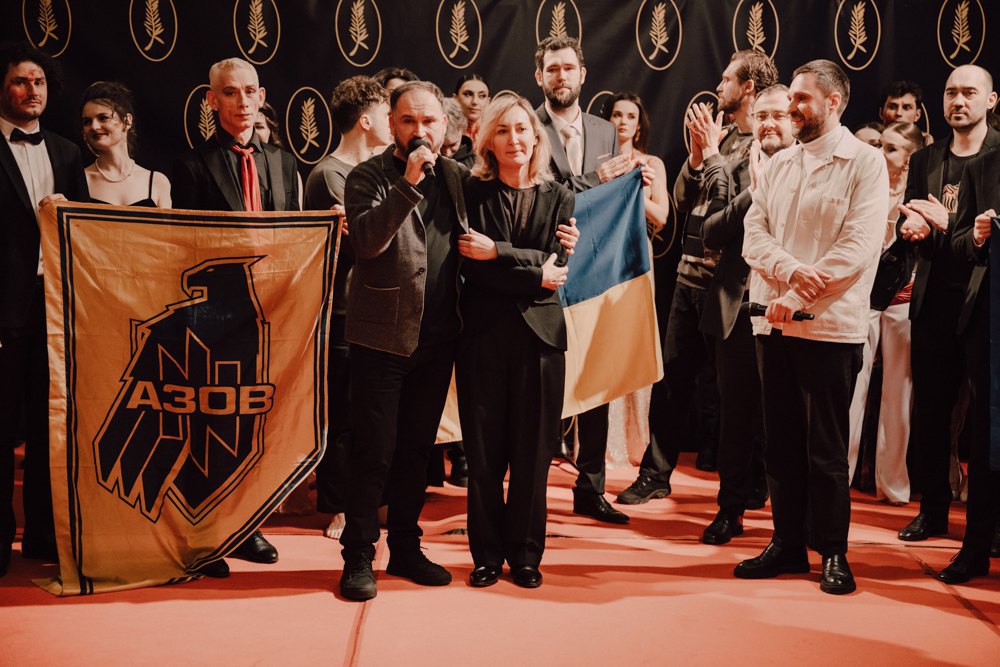
How was the play received in Poland? Mickiewicz is a central figure for Poles — like Shevchenko is for us. And you reinterpreted their Dziady through the lens of our war: there are Azovstal soldiers, a Cannes red carpet, “good Russians”…
That was Maja’s brilliant idea. The Poles were shocked. They told us that, thanks to our theatre’s Dziady, they finally understood what Mickiewicz had been writing about — because for them, it had become ancient history.
After one performance, a teacher — a Mickiewicz scholar — came up and asked us to record a video for his students, to help explain what Mickiewicz meant. Later, a Polish magazine called our Dziady the number one cultural event in Poland. Can you imagine? A Ukrainian production!
Thanks to Maja, we’ve become “one of their own” in Poland. And if everything works out, we’ll stage Macbeth next — a co-production with her theatre in Warsaw. That’s how it works.
Of course, not every collaboration brings such results. Working with foreign directors is always a risk — not everyone understands the Ukrainian context. At first, I gave them complete freedom, but then I realised they needed gentle guidance. Some are open to this, others resist. And that’s normal.
There’s also another layer where the Ukrainian theatre context differs significantly from the European one. Over the past month, the dominant media discourse around our theatre has centred on harassment. And Bilous’s case is far from the only one (Andriy Bilous, director of the Young Theatre and lecturer at the Kyiv National University of Theatre, Cinema and Television). There’s also the case of Linas Zaikauskas, who was convicted of harassment in Lithuania — yet the Odesa Opera House invites him to direct, and the Dnipro Theatre invites him to stage a feminist Macbeth. I know you refused to let him participate in the Shakespeare Festival. But why does our theatre still tolerate such people and such behaviour?
I think this is part of a broader reckoning — something our society is going through as a whole. We are breaking with toxic traditions and redefining what is considered normal. What was once accepted — like a director or theatre manager having a mistress among the actresses — is no longer okay. We are changing, but theatre is going through this transformation slowly and painfully.
And it’s especially painful when you think about what’s happening right now: our boys and girls, the best of the nation, are dying. We’re supposed to be fighting for human dignity, for truth — not just in Ukraine, but globally. And meanwhile, here we are.
I believe we have to go through this purgatory. I’ll be honest: I started questioning myself — wondering whether I had ever crossed a line, whether I had violated anyone’s boundaries. Thank God, no. But I did reflect deeply. I am a patriarchal person, I know that about myself. I’m a product of my time, my upbringing.
But I have two daughters. I listen to them — and I realise they already live by entirely different standards. They’re teaching me. And I simply can’t think the way I did ten or even five years ago.
Because if you’re not willing to re-examine your own thinking, if you’re not ready to confront your blind spots — then what right do you have to teach? I’m a teacher, a lecturer, a father. So I believe it must always begin with yourself. And I trust that, together, we’ll get through this stage.








